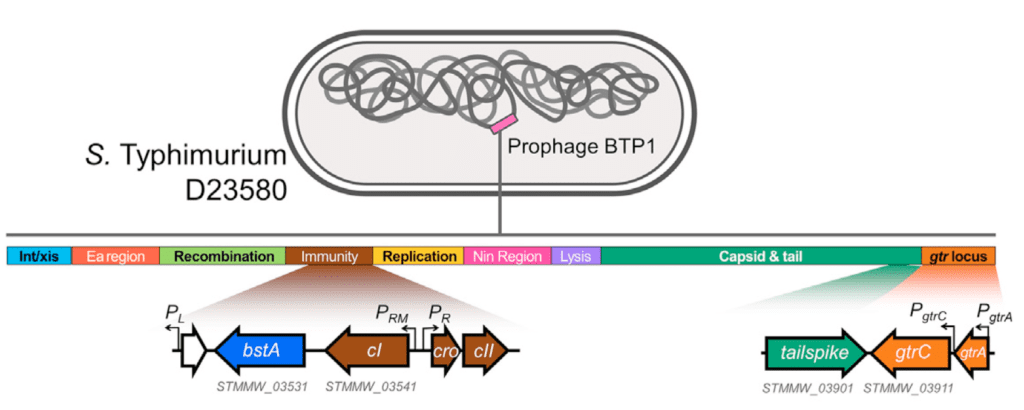Viruses of bacteria (bacteriophages or phages) have been engaged in a battle with their bacterial hosts for hundreds of millions of years. This conflict has driven the evolution of multiple bacterial defenses against phages, such as CRISPR-CAS and restriction/modification systems. But phages have also been engaged with other phages: apparently sharing a host is frowned upon. As such phage anti-phage systems have developed, so have systems to make the defenders immune to their own weapons.
Phage infection of bacteria can lead to lysis of the host, or to a state in which the phage genome has integrated into bacterial DNA as a prophage. The latter state, called lysogen, may at some point be reversed, leading to production of new phage progeny. Clearly in the lysogenic state it would not be good if another phage infected the cell – that would prevent the lysogen from reproducing. Consequently, defense systems have been discovered that are encoded in prophage DNA.
An example is a strain of Salmonella typhimurium that contains a 40 kb prophage (pictured) and is resistant to infection by phage P22. Deleting the prophage makes the bacteria susceptible to infection by P22. A protein called BstA, encoded in the prophage, is essential for defense against superinfection. BstA prevents superinfection by inhibiting DNA synthesis by the incoming phage.


But how can the prophage avoid inhibition by the BstA? Examination of the prophage revealed a 63 base pair DNA sequence that is essential for allowing the prophage to reproduce in the presence of BstA. As expected, removal of this short DNA, called aba for anti-BstA, from the prophage allows replication of both the prophage and P22. Exactly how abs antagonizes the inhibitory action of BstA is not yet known.
A variety of prophages from different bacteria appear to encode similar phage defense systems with cognate immunity. There is clearly a vast reservoir of phage defense and self-immunity systems that remain to be explored. Learning how they work is one goal, but unexpected rewards, such as realized for CRISPR-CAS, might also await the curious.

Pingback: Phages fighting phages | News I Can
Gee, this is so nice to know. Now I can go look at a whole new line of work.
Pingback: Phages fighting phages - Virology Hub